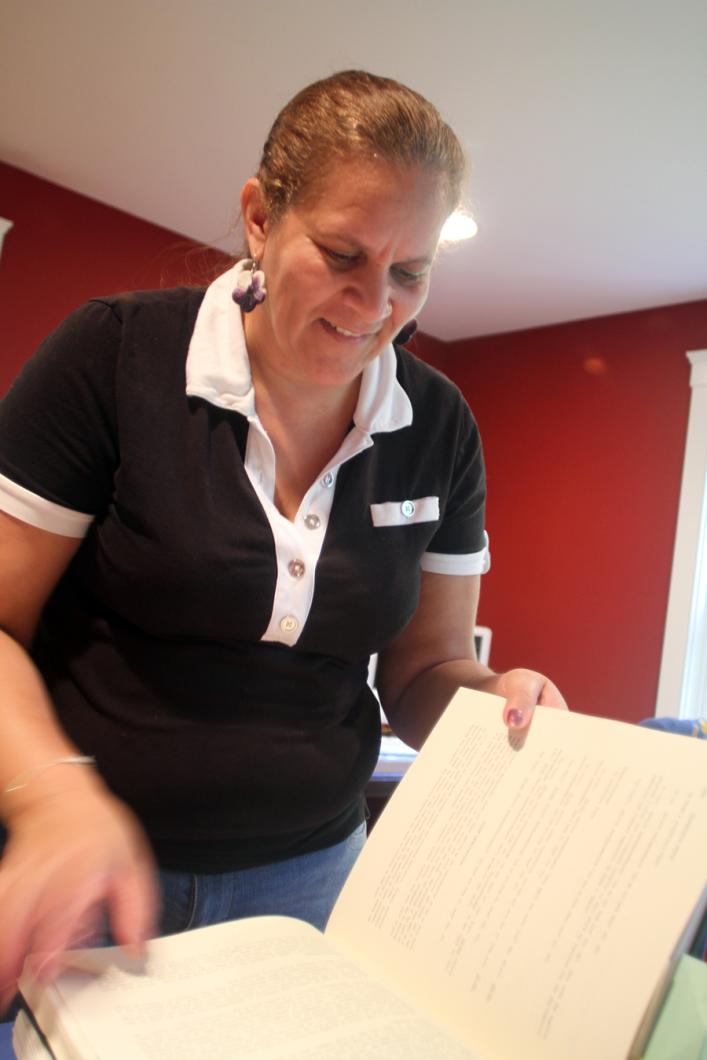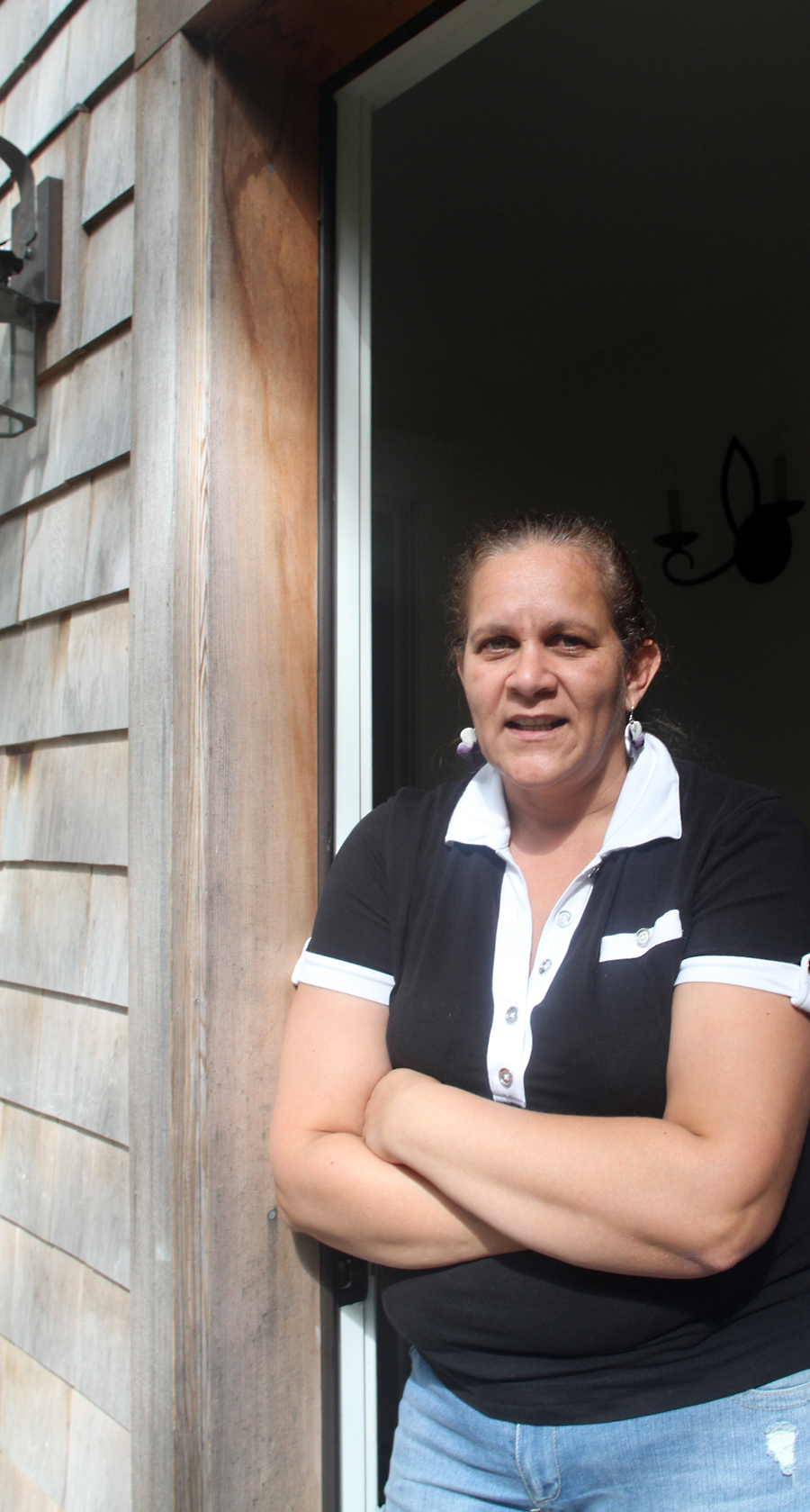Jessie Little Doe Baird was having a bad week. On Sept. 13 she went to a ceremony to ask for cleansing, to ask for help and to give thanks for the good and the bad in her life.
“We need both of those things, unfortunately. We do,” she said in an interview at her home in Aquinnah, built by her husband, the medicine man of the Wampanoag Tribe of Gay Head (Aquinnah), Jason Baird.
When her six-year-old daughter, Mae, got off the school bus that Monday afternoon — the child is the first native speaker of the Wampanoag language, Wôpanâak, in over a century and a half — Mrs. Baird settled into her ongoing work to resurrect her native tongue. Then the phone rang.
“There was a man on the other end of the phone and he said, ‘Are you Jessie Little Doe Baird?’ I said, ‘Yes.’ He said to me, ‘Are you alone?’ And I said, ‘Okay, you know something, I’ve had a long day, I don’t need to deal with this.’”
The tone of the conversation changed dramatically, however, when the man identified himself as a representative of the John D. and Catherine T. MacArthur Foundation. Mrs. Baird had been selected for the fellowship, or “genius award,” in recognition for her 17 years of linguistic work to restore the long-dormant language of her ancestors.
She couldn’t restrain herself.
“I just started crying and I couldn’t stop crying,” she said. “Just that someone recognizes that what you do has value to greater humanity — it’s enough that your work is validated.”
But the man on the phone wasn’t finished. There was a monetary component to the fellowship as well: a half-million dollars for Mrs. Baird to use at her discretion.
“I said ‘Shut up! Are you kidding me?’ He said, ‘I’m not,’ and I said, ‘Well, I think you are, and whoever thought of this joke, it’s a damn good one.’”
Immediately Mrs. Baird wanted to thank the nominating committee, but she was told she could never know who selected her for the prize. She also couldn’t tell anyone except for her husband until Sept. 28, when the prestigious prizes were officially announced.
A week after she received the MacArthur news, her Wôpanâak Language Reclamation Project was awarded a separate $530,000 grant from the federal Administration for Native Americans for a master-apprentice teaching program. She almost spoiled the MacArthur surprise when her fellow administrators wondered aloud where money would come from for supplies in the capped budget.
“This has been my last two weeks,” she said incredulously.
Mrs. Baird is an inveterate teacher, eager to enlist pupils, and the master-apprentice program is the first step in that effort. After two years of training, her salaried apprentices will be teacher-certified by the state of Massachusetts. Then the work turns towards establishing preschool and kindergarten campuses in Mashpee, the home of her tribe, and Aquinnah, the home of her husband’s. All subjects will be taught in Wôpanâak, and Mrs. Baird intends to add a grade to both of her schools each year.
The curriculum will be the end result of two decades of tireless, mentally-gruelling linguistic wrangling.
Fired by a series of dreams in which the spirits of her ancestors spoke to her in their ageless native tongue — “We are here,” they said — Mrs. Baird set out to reclaim her heritage. After earning a master’s degree in linguistics from the Massachusetts Institute of Technology (MIT), she set about devising a dictionary of Wôpanâak, using a 1663 translation of the Bible (which supplied a handy 60,000 words) and then scoured wills, deeds and centuries-old correspondences for gap words. The spelling of course needed to be standardized, but Mrs. Baird claims that was the easy part.
She realized the words were useless without an intuitive understanding of the grammar, and all other grammatical expositions of Wôpanâak were written in the impenetrably esoteric academese of linguistics. At her home workspace, she opened a page at random from a scholarly linguistics book that might as well be written in untranslatedWôpanâak.
“A lot of the people in this field write opaquely on purpose,” she said. “It’s like they’re trying to make you feel stupid.” Early in her academic career such intimidation had an impact on her.
“I felt so stupid — I still feel stupid all the time,” said the MacArthur-certified genius. “I cried for the first six weeks of school. Every afternoon I thought ‘I can’t do this, everyone’s counting on me and this is not going to happen.’”
Eventually Mrs. Baird realized she needed to bring the rarefied world of linguistics down to earth.
“Outside of their petty academic fields, there are actual people who need help. This stuff is not of any use to anyone who wants their birthright, which is to speak their own language,” she said. “That’s why I’m writing a layman’s grammar book.”
Wôpanâak grammar is fascinating from a Western perspective, a perspective Mrs. Baird would just as soon overturn (in the longer term she plans to write a history of New England from the long-neglected perspective of the Wampanoag). Unlike romance languages, which divide nouns by gender, the world o f the Wampanoag, and that of all of the more than 40 languages in the Algonquian language family, is governed by two realms: the animate and the inanimate.
What determines whether an object is animate or inanimate depends, according to Mrs. Baird, on several factors. All objects that are animate exhibit one of the following characteristics: it moves on its own, it allows something else to move in a complete circle, it causes an object to move in a forward deliberate direction, its parent material is animate, it’s used in ceremony or is a principle substance in a creation story, or it restricts the free movement of an animate object.
A tree is inanimate. A person is animate. Fingers are inanimate, though hips are animate as they allow a person to move in a complete circle. A canoe is not animate but the paddle is.
Particularly fascinating to Mrs. Baird is the fact that the sun in Wôpanâak is inanimate. The ocean is inanimate as well, though waves are animate. What this proves to her is that the Wampanoag had a staggeringly modern understanding of physics and the world around them. Heliocentricity was hard-wired into the language of her ancestors thousands of years before en lightened Europe was applauding itself for the same discovery.
“If you’re here for 10,000 years and there’s you and the environment, there’s no cars, there’s no horses, there’s no destruction of any kind, you’re going to intimately know about the environment,” she said. “Because it’s just you and the environment, that’s it — and you’re part of it.”
The language is a source of endless fascination to her (ever heard of fourth person?) and her enthusiasm is infectious when parsing the agglutinative etymology of the Wôpanâak word for ant: aneequhs (creature whose back faces up and puts things away) and squirrel: mushshaneequhs (huge creature whose back faces up and puts things away).
She only wants for her tribes what most of us take for granted.
“Before I die my people are going to have a useful grammar that anyone who can read English can read, they’re going to have a dictionary of stems where they can learn to say something they want to say, and there will be a school where they can learn the language if they want to.”
After a million-dollar September, Mrs. Baird’s dream is closer than ever.







Comments (2)
Comments
Comment policy »